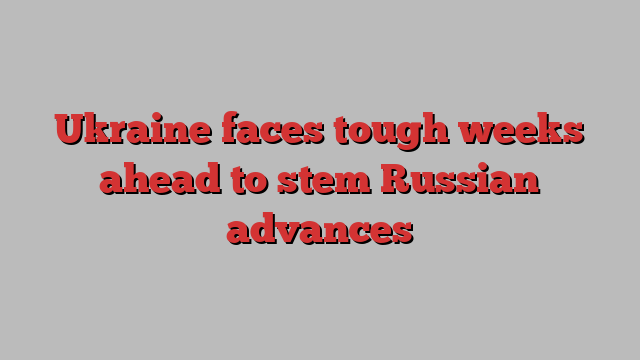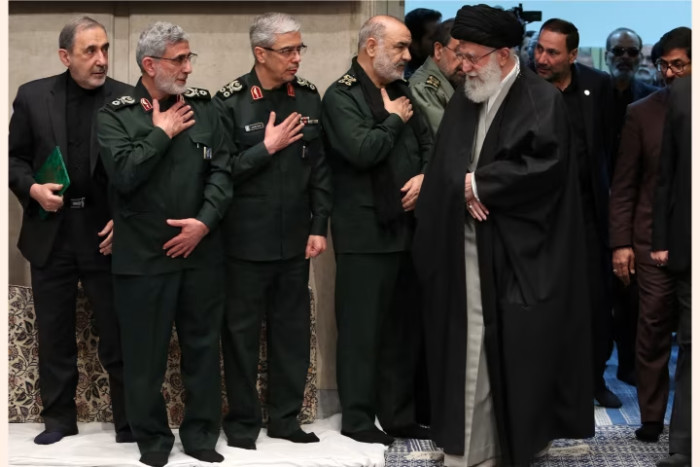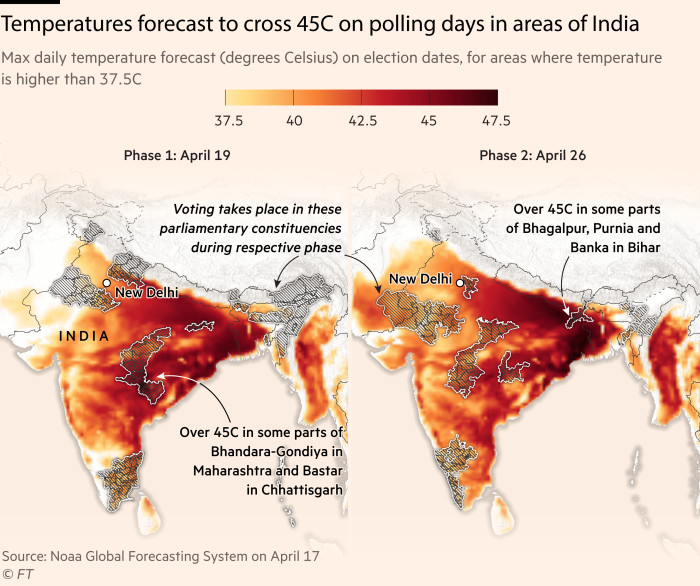
Stay informed with free updates
Simply sign up to the Global Economy myFT Digest — delivered directly to your inbox.
Good morning.
Ukraine faces tough weeks ahead in its fight to stem Russian battlefield advances despite this weekend’s passage of a long-awaited US funding bill, according to Ukrainian officials, soldiers and military analysts.
The US House of Representatives passed the $60bn military aid package on Saturday night after months of delay that have left Ukraine short of critical weaponry in the face of Russian advances.
American weapons and munitions will start flowing into Ukraine within the coming days if the bill is approved by the US Senate this week, as is widely expected.
But troops on the frontline told the FT during a visit this month that they were barely holding on under relentless Russian attacks to which they were unable to respond in kind. Here’s more on Ukraine’s race against time to deploy US funding.
-
Opinion: The vote to provide extra money for Ukraine, alongside separate votes providing substantial aid for Israel and Taiwan, offer a clear sense of how America — and its key allies in Europe and Asia — now see the world. Gideon Rachman explains why Ukraine is the frontline of a much larger conflict.
And here’s what else I’m keeping tabs on today:
-
India election: The country will redo voting at 11 polling stations in Manipur after reports of violence and damage to voting machines in the northeastern state. (Reuters)
-
Chinese Navy: China is hosting foreign naval officials from dozens of countries — including the US — at the Western Pacific Naval Symposium in Qingdao. (Reuters)
-
Trump ‘hush money’ trial: Opening arguments begin in the criminal trial of former US president Donald Trump.
-
Iran-Pakistan relations: Iranian President Ebrahim Raisi begins a three-day visit to Pakistan.
Five more top stories
1. Exclusive: Singapore has given international banks an unusual series of top-level briefings on geopolitics as it seeks to reassure them that the financial hub can remain stable and neutral at a time of rising tension between China and the west. The meetings have been held with US and European financial institutions including Citigroup and Standard Chartered as well as some local banks, according to people with knowledge of the talks. Here’s what else we know.
2. US secretary of state Antony Blinken will warn China that the US will take punitive steps unless it stops sending weapons-related technology to Russia. Blinken will raise the issue during a visit to China this week, though he does not plan to reveal what measures the US will take. But several people familiar with the situation said Washington is considering sanctions on Chinese financial institutions and other entities.
3. Western pharmaceutical groups are warning of worsening disruption to supply chains because of problems certifying manufacturing sites in China. “A large number” of factory inspectors from Germany, Europe’s largest inspectorate, are refusing to visit China for fear of arrest, according to the German Medicines Manufacturers’ Association.
4. The US is expected to blacklist a controversial Israeli military unit for alleged human rights abuses against Palestinians in the occupied West Bank, in its first sanctions against the Israel Defense Forces. The sanctions would ban the transfer of US military weaponry or any other forms of assistance to the Netzah Yehuda battalion, an all-male IDF infantry unit made up of ultra-Orthodox and religious nationalist Jewish recruits.
5. Indonesia’s sovereign wealth fund is aiming to invest up to $1bn this year with green energy as one of its priorities. The Indonesia Investment Authority is in talks over potential investment in the electric vehicle ecosystem and geothermal energy as the south-east Asian country aims to become a hub for the green transition on the back of its vast nickel reserves.
Explainer

Who pull the strings of power in Iran? While the country appears to be under the strict control of a single cleric, the Islamic Republic’s ruling elite has in fact entered a period of significant change as factions prepare for the battle to succeed the ageing supreme leader Ayatollah Ali Khamenei. The political flux has become a crucial factor in Middle East security, as Iran’s decades-long enmity with Israel reached dangerous new heights in recent weeks.
We’re also reading . . .
-
The danger of the very serious person: Grown ups are needed in these troubled times but must do a better job on the climate problem, writes Pilita Clark.
-
Kant and the case for peace: Three centuries after his birth, the Prussian philosopher’s arguments for a rational, clear-eyed pacifism are more relevant than ever.
-
Markets: While the reaction to the latest Iran-Israel hostilities has been tame, the global economy is too fragile for a new crisis, writes Mohamed El-Erian.
Graphic of the day
India is braced for “severe heatwaves” during its general elections, which take place over the next six weeks in staggered rounds of polling that will end on June 1. The extended period of outdoor rallies, roadshows and voting will coincide with temperatures expected to exceed 45C in places.

Take a break from the news
If you still find it hard not to stare at yourself when you’re on a Zoom meeting, then you are not alone. The FT’s Elaine Moore explains why the rise in video calls has birthed a whole new set of problems for tech companies — and us.

Recommended newsletters for you
Working It — Everything you need to get ahead at work, in your inbox every Wednesday. Sign up here
One Must-Read — The one piece of journalism you should read today. Sign up here